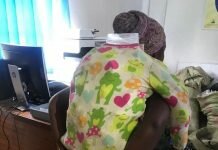Qamar Ali Haji has been using skin-lightening products for four years. Initially she liked the change in her appearance but now the exposure to the chemicals in the products is taking a toll. She says she regrets it.
“I can’t sit too long in the school, I cannot bear the heat, my cheeks turn red, and I cannot go into the kitchen,” Haji said. “I cannot bear the slightest heat, I become boiled, there are ulcers on my legs, redness all over.”
The 19-year-old student is one of a growing number of women in Somalia who use the skin-lightening products.
Health advocates say using these products can cause dangerous side effects and lead to physical and mental health problems.
Due to a lack of awareness, some people don’t realize how dangerous these products can be.
The issue has attracted the attention of Amira Adawe, a leading activist with a master’s degree in public health from Minnesota. Adawe has traveled to the Horn of Africa region multiple times in recent years as part of her research into the practice of skin-whitening.
She is the founder of Beautywell, an organization that has been addressing this issue in the United States.
Adawe said the skin-lightening products from Kenya and Somalia that she tested contained high levels of toxic chemicals like mercury, hydroquinone and lead.
Mercury, hydroquinone, steroids and lead are the four main chemicals found in skin-whitening products, according to Adawe. Mercury is a toxic heavy metal. Women who use skin-lightning products that contain mercury, can suffer neurological side effects, and develop depression and anxiety, Adawe added.
“We had a Somali woman in the state of Minnesota who actually lost her vision because of (the) neurological impact that came from the use of skin-lighting products containing mercury,” she told Women’s Square, a new VOA Somali program.
“Some people also develop diabetics because medically, skin-lightning products impact hormones … which impacts the insulin in our body,” she said.
Other health risks include hypertension, kidney problems, skin sensitivity and skin cancer as product users cannot tolerate any sunlight, Adawe said.
“Steroids can give them a lot of skin tenderness,” she added.
There’s also the possibility of a mother passing the toxicity to her baby if she is breastfeeding.
Skin-whitening is multibillion-dollar industry that targets women around the globe. Adawe says the practice is especially high in countries where regulations on toxic products are weak or nonexistent, like Somalia.
According to Adawe many people in Somalia are using skin-whitening products.
“I have done several focus group sessions, key informant interviews and surveyed two universities,” she said. “In all these more than 140 women, girls and some men participated, and all of the women and girls were using. Some of the men were using.”
The focus groups and interviews took place in Mogadishu and Hargeisa.
“Women that I interviewed … in Somalia had kidney problems and other health issues like very (a) bad smell of fish odor, skin redness, skin ulcers, blue skin pigmentation, headache, severe wound healing problems and endocrinological problems,” she said.
“All of these (health issues) are associated with the use of mercury, hydroquinone and steroids in skin-lightening products.”
Adawe shared her work with Somali officials and explained the health issues associated with exposure to the toxic ingredients in skin-lightening products.
In Mogadishu she met female parliamentarians who promised to support legislation to regulate skin-lightening products with toxic chemicals. She also has been communicating with the Somali ministry of health to increase awareness of the problem and find strategies for regulating the toxic products.
Interim manager of the National Medicine Regulatory Authority at the Ministry of Health, Dr. Farah Mohamed Sharawe was one of the officials who met Adawe last month. He admits the government has not researched skin-whitening products.
Dr. Mamunur Rahman Malik, the World Health Organization representative for Somalia, also met Adawe.
“These are poisons which should never be allowed to come in. She is using science to understand the scope of this problem and address these problems which are harmful to public health. She is doing it without any fear,” he said.
VOA














































